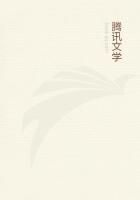Of these bows the one was straight and fair, and the other crooked and unsightly, and each of the arrows bore the name of some quality or emotion by which love is advanced or hindered. And as the dreamer was gazing into the spring of Narcissus (the imagination), he beheld a rose-tree "charged full of roses," and, becoming enamoured of one of them, eagerly advanced to pluck the object of his passion. In the midst of this attempt he was struck by arrow upon arrow, shot "wonder smart" by Love from the strong bow. The arrow called Company completes the victory; the dreaming poet becomes the Lover ("L'Amant"), and swears allegiance to the God of Love, who proceeds to instruct him in his laws; and the real action (if it is to be called such) of the poem begins. This consists in the Lover's desire to possess himself of the Rosebud, the opposition offered to him by powers both good and evil, and by Reason in particular, and the support which he receives from more or less discursive friends. Clearly, the conduct of such a scheme as this admits of being varied in many ways and protracted to any length; but its first conception is easy and natural, and when it was novel to boot, was neither commonplace nor ill-chosen.
After writing about one-fifth of the 22,000 verses of which the original French poem consists, Guillaume de Lorris, who had executed his part of the task in full sympathy with the spirit of the chivalry of his times, died, and left the work to be continued by another trouvere, Jean de Meung (so-called from the town, near Lorris, in which he lived). "Hobbling John" took up the thread of his predecessor's poem in the spirit of a wit and an encyclopaedist. Indeed, the latter appellation suits him in both its special and its general sense. Beginning with a long dialogue between Reason and the Lover, he was equally anxious to display his freedom of criticism and his universality of knowledge, both scientific and anecdotical. His vein was pre-eminently satirical and abundantly allusive; and among the chief objects of his satire are the two favourite themes of medieval satire in general, religious hypocrisy (personified in "Faux-Semblant," who has been described as one of the ancestors of "Tartuffe"), and the foibles of women. To the gross salt of Jean de Meung, even more than to the courtly perfume of Guillaume de Lorris, may be ascribed the long-lived popularity of the "Roman de la Rose"; and thus a work, of which already the theme and first conception imply a great step forwards from the previous range of mediaeval poetry, became a favourite with all classes by reason of the piquancy of its flavour, and the quotable applicability of many of its passages. Out of a chivalrous allegory Jean de Meung had made a popular satire; and though in its completed form it could look for no welcome in many a court or castle,--though Petrarch despised it, and Gerson in the name of the Church recorded a protest against it,--and though a bevy of offended ladies had well-nigh taken the law into their own hands against its author,--yet it commanded a vast public of admirers. And against such a popularity even an offended clergy, though aided by the sneers of the fastidious and the vehemence of the fair, is wont to contend in vain.
Chaucer's translation of this poem is thought to have been the cause which called forth from Eustace Deschamps, Machault's pupil and nephew, the complimentary ballade in the refrain of which the Englishman is saluted as Grant translateur, noble Gelfroi Chaucier.
But whether or not such was the case, his version of the "Roman de la Rose" seems, on the whole, to be a translation properly so called--although, considering the great number of MSS. existing of the French original, it would probably be no easy task to verify the assertion that in one or the other of these are to be found the few passages thought to have been interpolated by Chaucer. On the other hand, his omissions are extensive; indeed, the whole of his translation amounts to little more than one-third of the French original. It is all the more noteworthy that Chaucer reproduces only about one-half of the part contributed by Jean de Meung, and again condenses this half to one-third of its length. In general, he has preserved the French names of localities, and even occasionally helps himself to a rhyme by retaining a French word.
Occasionally he shows a certain timidity as a translator, speaking of "the tree which in France men call a pine," and pointing out, so that there may be no mistake, that mermaidens are called it "sereyns" (sirenes) in France. On the other hand, his natural vivacity now and then suggests to him a turn of phrase or an illustration of his own. As a loyal English courtier he cannot compare a fair bachelor to any one so aptly as to "the lord's son of Windsor;" and as writing not far from the time when the Statute of Kilkenny was passed, he cannot lose the opportunity of inventing an Irish parentage for Wicked-Tongue:
So full of cursed rage It well agreed with his lineage;For him an Irishwoman bare.
The debt which Chaucer in his later works owed to the "Roman of the Rose"was considerable, and by no means confined to the favourite May-morning exordium and the recurring machinery of a vision--to the origin of which latter (the dream of Scipio related by Cicero and expounded in the widely-read Commentary of Macrobius) the opening lines of the "Romaunt" point.















